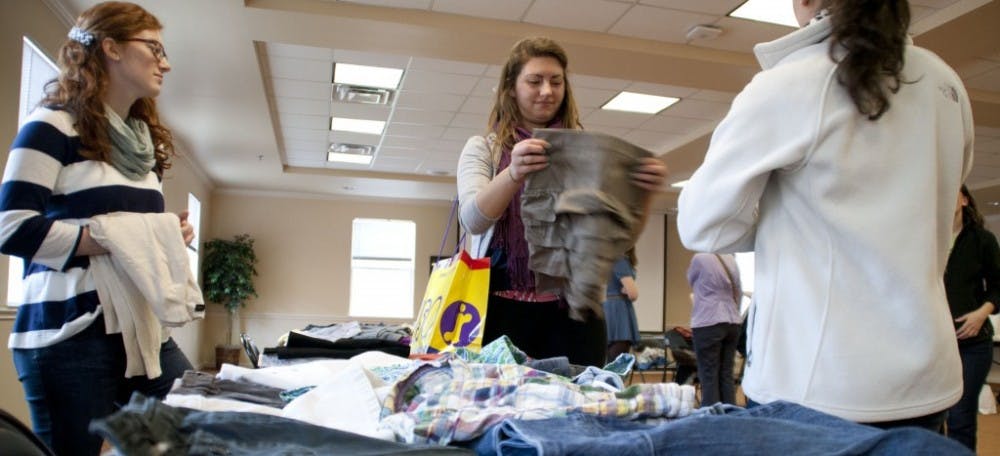They built their project on a simple fact. Elon students don't use nearly as much as they have.
“We have these huge closets and we feel the need to fill them up to the brim, but we wear about 30 items,” said sophomore Meaghan Fabrycki, one of the coordinators of Elon University’s service learning core.
This realization inspired the members of the service learning core, which constitutes the former residents of the service learning community, and residents of the service learning community to transform Oaks 212 into a thrift store Sunday, March 4.
Thrift stores attract the members of the service learning community because consumers are able to buy used clothing rather than support production where unethical labor practices could have been used, Fabrycki said.
Those in the service learning community included Elon students in their promotion of socially conscious consumer behavior.
Elon students were able to bring their clothes and accessories to the room and exchange them for another item. Clothing not taken will be donated to Crossroads, a safe house for female victims of domestic violence.
While the clothing swap provided a tangible service to the women at Crossroads, the coordinators also recognized environmental and educational benefit to the service project.
“Obviously, there is the economical benefit because it’s free, but you also have an environmental factor because you are recycling clothes and not buying brand new clothes, and human trafficking is addressed,” said sophomore Samantha Italiano, a member of the service learning core. Italiano said she believes a large portion of the clothing Americans wear is produced from human trafficking slave labor.
[quote]It’s easy to attribute the problem to a system, but at the heart of it, there are still people there. -Paige Ransbury, coordinator for the service learning core[/quote]
The students’ participation in the service learning community increased their consciousness regarding improper work conditions where a large percentage of clothing is produced, Fabrycki said.
“It’s easy to ignore, but once it’s pushed into your view, it’s hard to push it away again,” she said.
Nevertheless, members of the service learning core understand it's not enough for students to know statistics, according to Fabrycki.
“There is a person within each statistic,” she said.
The clothing exchange contributed to the socially-conscious group’s effort to increase awareness of human trafficking and reduce unknowing support for unethical work practices, Fabrycki said.
Providing students with an opportunity to become personally involved in the project reveals the human aspect of larger social issues, said Paige Ransbury, a coordinator for the service learning core.
“It’s easy to attribute the problem to a system, but at the heart of it, there are still people there,” Ransbury said. “When you make it more personal, you recognize it’s not a big, overarching thing.On an individual level, people are being affected.”
The exchange enables the students to engage in discussions concerning these social issues, supporting the mission of the service learning community, said senior Mary Yost, one of the coordinators.
“The mission of the SLC is to really connect students to the community and find your passion for service,” Yost said.
Nevertheless, the coordinators agreed the clothing swap bridges individuals on a variety of levels.
“It connects our small (service learning) community, but we’re bringing in other students and then reaching out to the community around us, so it’s connecting the community on three different levels,” Ransbury said.


